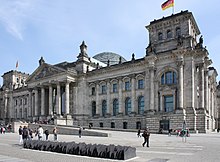Eugen Eppstein
Eugen Eppstein (born June 25, 1878 in Simmern / Hunsrück , † March 1943 in the Lublin-Majdanek concentration camp ) was a communist politician and member of the Reichstag in the Weimar Republic.
Life
The son of the Jewish teacher Joseph Mayer-Eppstein from Simmern completed a commercial apprenticeship in Cologne , where he joined the SPD in 1897 . Belonging to the left wing of the party, he rejected the SPD's truce policy from 1914 and became a member of the Spartacus group during the First World War and of the KPD in 1918 , for which he had worked full-time since it was founded. After being arrested in mid-1919 and escaping in November 1919, he went to Cologne, where he had his political focus for the next few years. He succeeded Franz Dahlem Polleiter and secretary of the Middle Rhine district, which he also represented on the party's central committee until 1925. Belonging to the "left" wing around Ruth Fischer and Arkadi Maslow , he was released from his post in 1923 by the "right" party leadership under August Thalheimer and Heinrich Brandler , but reinstated in February 1924.
In 1924 he ran in the Reichstag elections in May in constituency 23 Düsseldorf-West and moved into the Reichstag as one of 62 parliamentary party members of the KPD , but was briefly arrested again after its dissolution the following October and lost his mandate again on the occasion of the new elections on 7. December of the year. In the same year, the new party leadership under Fischer and Maslow ordered him to Bremen, where he succeeded in bringing this “right-wing district” onto the party line as a polling officer for the Northwest District. He was also a member of the Prussian state parliament from the end of 1924 . In 1925, Eppstein came under fire from within the party because opponents within the party accused him of having worked too closely with his former political colleague Peter Mieves , who was accused of spying for the police. The party leadership expressed their full confidence in Eppstein in this connection.
After the intervention of the Comintern under Stalin in the factional struggles within the KPD, Eppstein was relieved of his functions in January 1926 by the new party leadership under Ernst Thälmann and joined the inner-party left opposition. In January 1928 he resigned from the party and a little later joined the newly founded Lenin League , which he left again after a short time together with the circle around Fischer and Maslow (with whom he remained closely connected politically). In 1929, Eppstein submitted an application for re-admission to the KPD, which, however, was rejected.
In 1933 he emigrated with his wife to France, where he continued to be politically active in various left-wing organizations. On August 16, a meeting took place in the Ministry of the Interior in Berlin, at which a list was drawn up of the people whose German citizenship was to be revoked and expatriation ordered . On this list of 33 names were Eugen Eppstein - according to the note "well-known communist leader, engaged in the reorganization of communist propaganda in France since February 1933" - other well-known names: Heinrich Mann and Kurt Tucholsky . With the official announcement No. 198 of August 25, 1933, the expatriation was carried out.
In 1939/1940 he was interned in France and after the occupation in 1940 he was arrested by the Gestapo . An entry visa for the USA did not reach him in time. On October 3, 1942, he was transferred from the Rivaltes residence camp to the Nexon camp and from there to the Camp de Gurs camp . On February 26, 1943 he was transferred from Gurs to the Drancy assembly camp and transported to the Majdanek concentration camp on March 4, 1943 , where he was presumably murdered immediately.
Honors
Since 1992 one of the 96 memorial plaques for members of the Reichstag murdered by the National Socialists has been commemorating Eppstein near the Reichstag in Berlin .
literature
- Eppstein, Eugene . In: Hermann Weber , Andreas Herbst : German Communists. Biographisches Handbuch 1918 to 1945. 2nd, revised and greatly expanded edition. Dietz, Berlin 2008, ISBN 978-3-320-02130-6 .
Web links
- Eugen Eppstein in the database of members of the Reichstag
Individual evidence
- ↑ Michael Hepp (Ed.): The expatriation of German citizens 1933-45 according to the lists published in the Reichsanzeiger . tape 1 : Lists in chronological order. De Gruyter Saur, Munich 1985, ISBN 978-3-11-095062-5 , pp. 3 (reprinted 2010).
| personal data | |
|---|---|
| SURNAME | Eppstein, Eugene |
| BRIEF DESCRIPTION | German politician (SPD, KPD), MdR |
| DATE OF BIRTH | June 25, 1878 |
| PLACE OF BIRTH | Simmern / Hunsrück |
| DATE OF DEATH | March 1943 |
| Place of death | Majdanek concentration camp |

